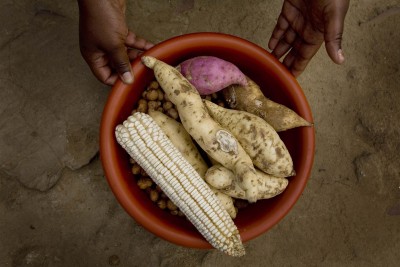Number of Hungry People Further Increased in 2021
The number of people going hungry worldwide continued to rise in 2021. Several factors contributed to the increase, including conflicts, economic crises, and weather extremes, according to a report released today by the Network Against Food Crises.
 Many countries today are still threatened by acute hunger and food insecurity. / Picture: © Wikimedia Commons /Africa Food Security 3 /Kate Holt/AusAID / CC BY 2.0
Many countries today are still threatened by acute hunger and food insecurity. / Picture: © Wikimedia Commons /Africa Food Security 3 /Kate Holt/AusAID / CC BY 2.0
The number of hungry people in the world increased last year. Famines continue to be one of the greatest humanitarian disasters that can happen. Famines are caused by wars, economic crises, and weather extremes.
The war in Ukraine also threatens food security not only in Ukraine but also in the world. Indeed, Ukraine is a breadbasket, supplying food to many countries around the world, including those in Africa.
According to the report of the Global Network against Food Crisis (GNAFC) around 193 million people in 53 countries were acutely vulnerable to poor nutrition in 2021. The number of people affected was thus reported to have risen by almost 40 million compared with 2020, following the trend of recent years in which more and more people were at risk of food insecurity.
According to the report of the Global Network against Food Crisis, in four countries, Afghanistan, South Sudan, the Syrian Arab Republic and Yemen, more than half of the analyzed populations were in Crisis or worse. The people in many countries suffer from hunger, especially in Africa. Further, a big part of the World population has issues with food security.
A growing number of people are experiencing acute food insecurity and in need of life-saving food assistance and livelihood support. Rather than just reacting when food crises occur, it is more important than ever to address their underlying causes.
Tackling the problem
According to the report of the Global Network Against Food Crises, an international alliance of the United Nations, the European Union and governmental and non-governmental agencies working to tackle food crises together.
Today the Austrian Council of Ministers approved an Austrian contribution totaling €45.9 million from the Foreign Disaster Fund (AKF) to help stem the humanitarian crisis in Ukraine and the looming food crisis in the Middle East and North Africa.
Of the 45.9 million euros, 4 million euros will be donated to the World Food Programme and 41.9 million euros to the Neighbors in Need Foundation.
The key drivers behind rising acute food insecurity
The key drivers behind rising acute food insecurity in 2021 were mainly conflicts, weather extremes and economic shocks.
The main drivers are conflict and war. Conflicts pushed around 139 million people in 24 regions around the globe into acute food insecurity in 2021. In 2020 the number cumulated around 99 million in 23 regions of the world.
The climate crisis is becoming more and more noticeable and this is also reflected in food security issues. Weather extremes pushed over 23 million people in 8 countries/territories into acute food insecurity in 2021, up from 15.7 million in 15 countries/territories in 2020.
The most classic reason for food shortages and famines is economic crises. Economic shocks pushed over 30 million people in 21 regions into hunger, down from over 40 million people in 17 countries/territories in 2020, mainly due to the fallout from the COVID-19 pandemic.
War emerges as the strongest cause of famine. The war in Ukraine did not help the hungry people of the world but worsened their situation.
Ukraine supplies crops to the Middle East and North Africa. Mariupol itself is an important port from which food is transported to these regions. This is one of the reasons why Vladimir Putin wants to take Mariupol, as reported by Vindobona.org.
The risk of acute hunger is particularly high for countries already dealing with high levels of acute hunger, especially those that are highly dependent on imports of food and agricultural inputs and vulnerable to price shocks globally.



